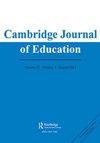“自下而上的治理”:话语、实践与国家的二元性
IF 1.5
3区 教育学
Q2 EDUCATION & EDUCATIONAL RESEARCH
引用次数: 0
摘要
摘要本文通过对以色列教师领导力倡议的案例研究,探讨了一种采用“自下而上”逻辑和话语的教育治理模式。作者分析了这一倡议的起源,并通过在地区一级制定该倡议的政策民族志,展示了如何通过“自上而下”的结构和战略来维持和管理该倡议。作者使用“自下而上的治理”一词来描述一种混合的话语,这种话语重视基层领导,通过行为者的自主性和自反性进行治理,由复杂的外部和内部教育行为者制定,以及由中央政府发起和控制,中央政府提供的资源不足、暂时和不稳定。他们的分析强调了中层决策者在这种治理模式中的矛盾和复杂角色,以及以色列教育系统同时追求集权和分权,以及“弱国家”和“强国家”战略。本文章由计算机程序翻译,如有差异,请以英文原文为准。
‘Bottom-up governance’: discourse, practices and the duality of the state
ABSTRACT This paper uses a case study of an Israeli teacher leadership initiative to explore a mode of educational governance that employs ‘bottom-up’ logic and discourse. The authors analyse the origins of this initiative, and – through a policy-making ethnography of the initiative’s enactment at the district level – show how it is sustained and governed through ‘top-down’ structures and strategies. The authors use the term ‘bottom-up governance’ to describe a hybrid mixture of discourse that valorises grass-roots leadership, of governance through actors’ autonomy and reflexivity, of enactment by a complex array of external and internal educational actors, and of initiation and control by central government, which provides insufficient, temporary and unstable resources. Their analysis highlights the conflicted and complex role of mid-level policy-makers in this mode of governance, as well as the simultaneous pursuit by the Israeli education system of centralisation and decentralisation, and ‘weak state’ and ‘strong state’ strategies.
求助全文
通过发布文献求助,成功后即可免费获取论文全文。
去求助
来源期刊

Cambridge Journal of Education
EDUCATION & EDUCATIONAL RESEARCH-
CiteScore
5.30
自引率
4.30%
发文量
35
期刊介绍:
Cambridge Journal of Education publishes original refereed articles on all aspects of education, with a particular emphasis on work that contributes to a shared understanding amongst academic researchers, theorists, practising teachers, policy-makers and educational administrators. The journal also welcomes the submission of systematic review articles that summarise and offer new insights into specific areas of educational concern. With a wide international readership, Cambridge Journal of Education publishes contributions drawn from different educational systems and cultures enabling continued in-depth discussion of global educational theory, policy and practice. The journal’s Special Issue programme encourages and stimulates focused discussion and engagement with significant themes and responses to topics raised by readers and contributors. Cambridge Journal of Education welcomes proposals for future editions.
 求助内容:
求助内容: 应助结果提醒方式:
应助结果提醒方式:


